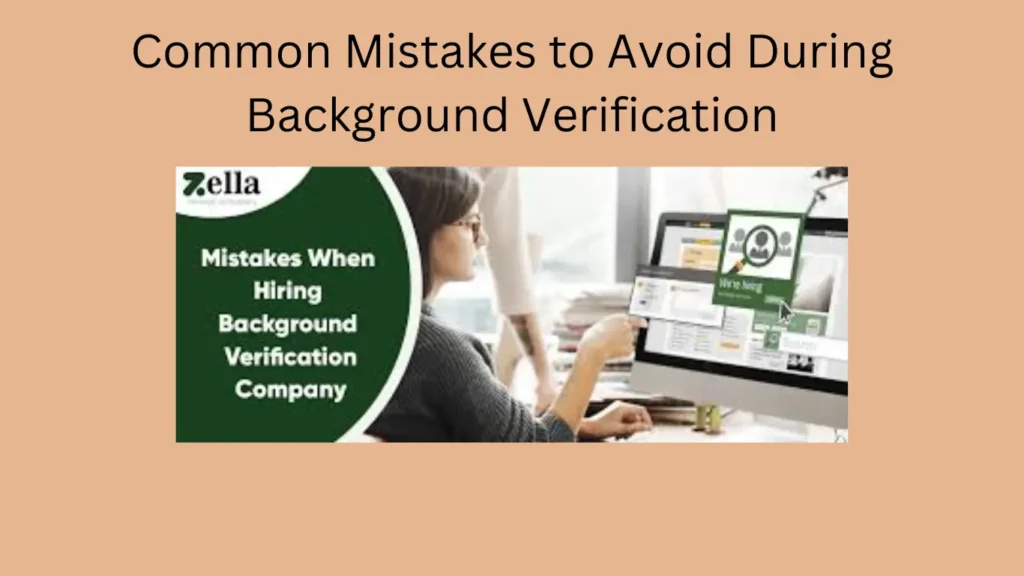Background verification is a critical step in the hiring process, but it can be complex and prone to errors if not conducted carefully. Avoiding common mistakes is crucial to ensure accurate and reliable results. This guide highlights the most common mistakes to avoid during background verification, helping employers conduct thorough and compliant checks.
1. Inadequate Consent and Disclosure
Mistake: Failing to obtain written consent from candidates before conducting a background check or not providing a clear disclosure of the nature and scope of the check.
Impact: Non-compliance with legal requirements, leading to potential legal issues and damage to employer reputation.
Solution: Ensure candidates provide written consent and receive a clear disclosure of the background check process before proceeding.
2. Not Verifying Information Thoroughly
Mistake: Relying solely on automated tools or not verifying information from multiple sources, such as directly contacting previous employers or educational institutions.
Impact: Inaccurate or incomplete information, leading to hiring the wrong candidate or missing important red flags.
Solution: Verify information from multiple sources and use automated tools as a supplement, not a replacement, for thorough verification.
3. Ignoring Ban-the-Box Laws
Mistake: Asking about criminal history too early in the hiring process or using blanket policies that automatically disqualify candidates with a criminal record.
Impact: Non-compliance with ban-the-box laws, which aim to reduce discrimination against candidates with criminal histories.
Solution: Delay inquiries about criminal history until later in the hiring process and ensure any inquiries are job-related and consistent with business necessity.
4. Lack of Privacy and Data Security
Mistake: Mishandling or exposing sensitive candidate information, such as personal identification details or background check results.
Impact: Breach of privacy laws, loss of candidate trust, and potential legal repercussions.
Solution: Implement robust data security measures, limit access to sensitive information, and comply with data protection regulations.
5. Skipping Adverse Action Procedures
Mistake: Failing to follow proper adverse action procedures, such as providing candidates with a pre-adverse action notice and an opportunity to dispute the findings.
Impact: Violation of the Fair Credit Reporting Act (FCRA) and other regulations, leading to legal liabilities and damaged employer reputation.
Solution: Follow FCRA guidelines and provide candidates with a pre-adverse action notice, a copy of the background check report, and a summary of their rights before taking adverse action.
Conclusion
By avoiding these common mistakes, employers can conduct background verification more effectively, ensuring accurate and reliable results while complying with legal requirements. Thorough verification, obtaining proper consent, complying with ban-the-box laws, ensuring data security, and following adverse action procedures are essential for a successful background verification process.
For further Inquires Contact Us
FAQs
Why is obtaining written consent important in background verification?
- Obtaining written consent ensures compliance with legal requirements and demonstrates respect for candidate privacy.
How can employers verify information thoroughly during background checks?
- Employers should verify information from multiple sources, such as directly contacting previous employers or educational institutions.
What are ban-the-box laws, and how do they affect background verification?
- Ban-the-box laws restrict employers from asking about criminal history too early in the hiring process and require inquiries to be job-related.
What measures can employers take to ensure privacy and data security in background verification?
- Employers should implement robust data security measures, limit access to sensitive information, and comply with data protection regulations.
What are the adverse action procedures employers should follow during background verification?
- Employers should provide candidates with a pre-adverse action notice, a copy of the background check report, and an opportunity to dispute the findings before taking adverse action.
